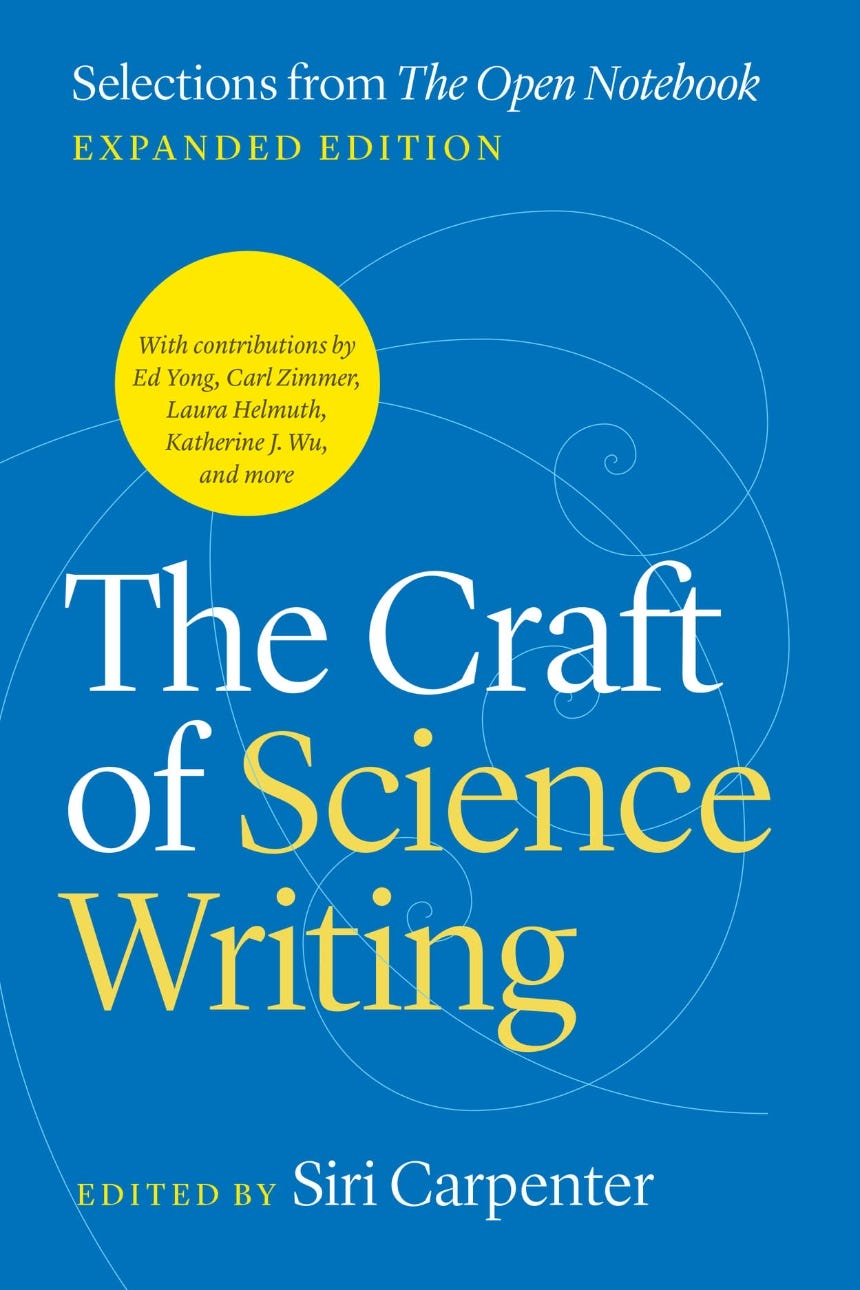✍️Science Writing News Roundup #213
Hurricane aftermath: Damage to infrastructure, health, and the environment + Why Scientific American endorsed Kamala Harris.
Pre-Order The Open Notebook’s New Book: An expanded edition of The Craft of Science Writing will drop Nov. 5. Pre-order to save 30% (code: UCPNEW). The book is a deeply sourced, inclusive guide to all aspects of science writing with contributions from some of the most skilled and award-winning authors working today.
Welcome! You are reading the Science Writing News Roundup, a newsletter for science writers. You can also read this edition online. Did someone forward you this newsletter? Sign up here.
📚Articles
Climate change stories are everywhere. Here’s how to find them. Want to bring it home for your audience? Don’t shy away from the gross side.
How I Did It: From ‘internet rabbit hole’ to compelling series. Katie Palmer typically covers health technology. But when she stumbled across a paper about how a risk calculator might place Black women at higher risk of complications from a vaginal birth after a Cesarean section (VBAC), she found the topic “too interesting and important not to cover.”
My First Byline: Lauren Leffer is a freelancer with a contributing writer title at Popular Science and Scientific American. In this interview, she talks about her first byline, and advises people looking to break into journalism.
Closing the gap: Bridging the divide between research and writing. “The benefits of combining my research and writing processes have been enormous. For one thing, I work faster. Not like a little bit faster, but like, twice or three times as fast,” writes Julia Rosen.
Ferris Jabr on How the Planet Came to Life: Ferris Jabr (KSJ '22) unfolds the science behind one of humanity's oldest beliefs, that our world is alive, in his new book "Becoming Earth."
A Day in the Life of Jonathan Lambert: Jonathan Lambert is a Washington, DC–based freelance journalist who covers science, health, and policy. He’s been a staff writer at Grid and Science News, and has written for The Atlantic, Nature News, NPR, Quanta Magazine, and The Dallas Morning News.
🔊Resources
Report: U.S. spends the most on health but outcomes are among the worst. In this election year, a new report shows it’s well beyond time for journalists and voters to hold politicians accountable for the poor quality of America’s health care system.
Investigating How Conflict and War Contribute to Methane Emissions. How can reporters learn from new tools about specific causes of methane leaks in conflict-affected areas?
Coordinating schedules isn’t easy: But there are lots of tools to help.
📻News
The National Association of Science Writers announced the results of its 2024 board election. The new NASW Board of Directors officially begins their term on Monday, Nov. 11, coinciding with ScienceWriters2024 in Raleigh. The NASW and its Awards Committee also announced the winners of the 2024 Excellence in Institutional Writing Awards (EIWA) and the 2024 NASW Science in Society (SIS) Journalism Awards. This year, NASW is awarding prizes in six categories: Books, Science Reporting, Science Features, Longform Narratives, Series, and Commentary.
The FNIH Awards the Inaugural Kovler Prize for Trust in Life Science Journalism to Katherine J. Wu, PhD. Dr. Wu is known for her authoritative and insightful reporting on COVID-19. She also has written extensively on science and health topics for several leading media outlets.
UNSW Press announces the shortlist for the UNSW Press Bragg Prize for Science Writing 2024. To recognize the best of the best, UNSW Press has established an annual prize for the best short non-fiction piece on science written for a general audience.
FRONTIERS Science Journalism in Residency Program Receives 47 New Applicants. Applications are currently under review by a committee of experts from the FRONTIERS consortium and its Advisory Board, with results expected to be announced by November 2024.
🗂️Opportunities and calls for pitches
🌍Videos
Hurricane aftermath: Damage to infrastructure, health, and the environment
How Science Journalists Confront Bias–in Their Stories and in Themselves
We Know What It Takes to ‘Cover the Planet’. Where Do We Go from Here?
Press Briefing: How Do We Know Climate Change Fueled That Storm?
How to Improve Access to Climate Information and Curb Misinformation in the MENA Region
🎞️Events
Hostile Waters: Orcas in Peril: AAAS Kavli Science Journalism Award Lecture Series with Lynda V. Mapes sponsored by the University of Washington Department of Communication (October 16, 2024)
ScienceWriters2024 (October 17-18, November 8-11, 2024)
Science Journalism Forum (October 28-31, 2024)
More events👉Bonus content for monthly supporters.
🌱Jobs
Thanks for reading! Subscribe for free to receive the next post in your inbox:
Worried you missed something? See previous posts here. What would you like to see in the newsletter? Please send me your suggestions: sciencewriting@substack.com



